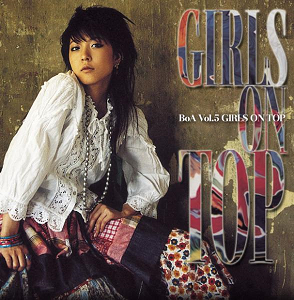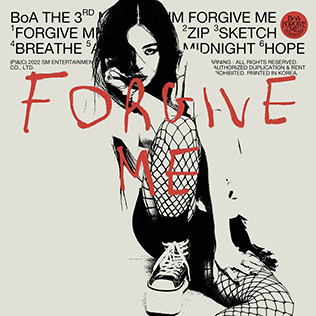
Kwon Bo-ah, known professionally as BoA, is a South Korean singer, songwriter, dancer, producer and actress. She is often referred to as the "Queen of K-pop".

An Chil-hyun, known professionally as Kangta, is a South Korean singer, composer, songwriter, record producer, actor and radio personality. He is well known as a member of boy band H.O.T. and the creative director of SM Entertainment since 2005. He is the executive producer of Kreation Music Rights's label Smashhit since 2023.

Miracle is the second compilation album by South Korean singer BoA, released through SM Entertainment on September 24, 2002. The album contains Korean versions of BoA's 2002 Japanese songs. The song "Every Heart" was first released in Japan and the Korean version is used as the end theme of anime Inuyasha.

Atlantis Princess is the third Korean studio album by South Korean recording artist BoA, released through SM Entertainment on May 30, 2003. The record spawned three singles, including the Seoul Metropolitan Government promotional single "Lights of Seoul", the title track "Atlantis Princess", and "Milky Way", with accompanying music videos produced for the latter two songs. An overseas version of the album, containing a bonus video CD, was released in several territories in Asia such as the Philippines, Hong Kong and Taiwan.

My Name is the fourth Korean-language studio album by South Korean recording artist BoA, released through SM Entertainment on June 11, 2004. BoA promoted the album with the singles "My Name" and "Spark", the latter of which is a Korean-language cover of "Keep My Cool" (2002) by Luis Fonsi. The album saw BoA's transition into a more mature image in comparison to her previous records.

Girls on Top is the fifth Korean studio album by South Korean recording artist BoA, released through SM Entertainment on June 23, 2005. A repackage of the album, titled Moto, was released on August 17, 2005. The record saw a continuation of BoA's image change that began with her prior album My Name (2004); Girls on Top sought to portray a "mature and self-confident" image with themes expressing female empowerment. In Japan, a special edition of the album including a DVD was released by Avex Trax on March 26, 2008.

Listen to My Heart is the debut Japanese studio album by South Korean recording artist BoA, released via Avex Trax on March 13, 2002. BoA worked with a team of songwriters and composers to produce the album, including Natsumi Watanabe, Kazuhiro Hara, Ken Harada and Akira; all of whom would collaborate with BoA again on her future albums. Musically, Listen to My Heart is primarily a pop record with influences from R&B.

"Everlasting" is a song by South Korean recording artist BoA. It was released as her 18th Japanese single under Avex Trax on January 18, 2006, and her 4th physical Korean single under SM Entertainment a week later on January 25, 2006. The leading track "Everlasting" is a ballad, and the B-side track of the Japanese release, "Soundscape", is a mid-tempo song. "People Say..." serves as the B-side track for the South Korean release. The single also contains a "classical version" of "Everlasting".

"Every Heart " is a song recorded by South Korean singer BoA. It was released as her fifth single under Avex Trax on March 13, 2002, the same day as her Japanese debut album Listen to My Heart. It was featured in the hit anime, Inuyasha, as the fourth and the second (Korean) ending theme song.

"Valenti" is a song by South Korean singer BoA. It was released for her second Japanese studio album of the same name (2003) on August 28, 2002, serving as her sixth Japanese single under Avex Trax. It features "Realize " as a B-side. A Korean version of "Valenti" was released as part of her compilation album Miracle, which was made available by SM Entertainment on September 24, 2002.

"Meri Kuri", known in South Korea as "Merry-Chri", is a song recorded in two languages by South Korean singer BoA. A holiday-themed ballad, its lyrics were written by Chinfa Kan and BoA; production was handled by Kazuhiro Hara. It was released on December 1, 2004, as her 14th Japanese single, via Avex Trax; and her 3rd physical Korean single, by SM Entertainment. Both versions are supported with the B-side tracks "Mega Step" and "The Christmas Song". Its music video premiered on her 18th birthday and was shot at the Chapel on the Water and Ochiai Station in Hokkaidō.

Rising Sun is the second Korean-language studio album by South Korean boy group TVXQ, released on through SM Entertainment on September 12, 2005. Musicians including Yoo Young-jin, Kenzie, Hwang Sung Je and All-4-One's Jamie Jones took part in the album's songwriting and production. Musically, Rising Sun is primarily a pop album, but also includes tracks that utilize styles such as hip-hop, rock, teen pop, and ballads.

Hurricane Venus is the sixth Korean language studio album by South Korean singer BoA, released on August 2, 2010, by SM Entertainment, to coincide with the tenth anniversary of the singer's career. It is BoA's first major Korean-language release since the repackage version of Girls on Top in 2005, and subsequently her second major release in a year following her seventh Japanese album Identity in February 2010.

Aespa is a South Korean girl group formed by SM Entertainment. The group consists of four members: Karina, Giselle, Winter, and Ningning. The group is known for popularizing the metaverse concept and hyperpop music in K-pop.
"Milky Way" is a song recorded by South Korean singer BoA from her third studio album, Atlantis Princess, released through SM Entertainment on May 30, 2003. The song was composed, written, and arranged by SM songwriter Kenzie.
Remastering Project is a music video remastering project by South Korean record label SM Entertainment and YouTube. The project intends to remaster music videos from the 1990s to the 2010s. It also plans to showcase the history of K-pop to international music fans to contribute to the growth of the Korean music industry. Remastered music videos were sequentially released starting from November 4, 2021.

Got the Beat is a South Korean supergroup and first sub-unit of project group Girls On Top. Formed by SM Entertainment in 2022, composed of the seven female artists who already debuted under the agency: soloist BoA, Taeyeon and Hyoyeon from Girls' Generation, Seulgi and Wendy from Red Velvet, and Karina and Winter from Aespa.

Forgive Me is the third extended play by South Korean singer BoA. It was released by SM Entertainment on November 22, 2022, and contains six tracks, including the lead single of the same name.
"Atlantis Princess" is a song by South Korean recording artist BoA for her third Korean studio album of the same name. It was released via SM Entertainment as part of the album on May 30, 2003. Produced by Hwang Sung-jae with lyrics penned by Tae-hoon, the song is a pop and dance number with lyrics revolving around pursuing one's dreams and aspirations.
















